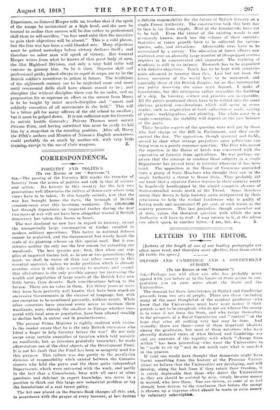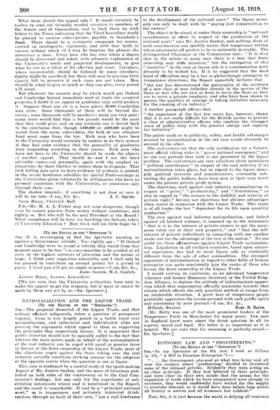LETTERS TO THE EDITOR.
[Letters of the length of one of our leading paragraphs are often more read, and therefore more effective, than those which fill treble the space.] OXFORD AND CAMBRIDGE AND A GOVERNMENT SUBSIDY.
LTo THE EDITOR OF THE " SPECTATOR."3 SIR,—Perhaps you will allow one who has probably never agreed with you before as to the limits of State action to con- gratulate you on your notes about the State and the Universities.
The demand for State interference at Oxford and Cambridge proceeds from two sets of people. There are those—including many of the most thoughtful of the resident graduates—who know that the Universities must have more money if their growth is not to be atrophied, who do not see whence the money is to come if not from the State, and who resign themselves to the prospects of a Royal Commission and " control " in the hope that after all nothing very bad may be done. And secondly, there are those—some of them impatient idealists among the graduates, but most of them outsiders who have absurdly distorted views of what Oxford and Cambridge are and are unaware of the rapidity with which " change from within " has been proceeding—who want the Universities to be "made to sit up" and do not much care what is smashed in the process.
If (and one would have thought that democrats might have learnt something from the history of the Prussian Univer- sities) we believe that the Universities are developing, and will develop, along the best lines if they retain their freedom, it is surely deplorable that those who detest the Universities as they are should be assisted by men, simply because money is wanted, who love them. You are driven, as some of us had already been driven, to the conclusion that before the sponge is thrown up a supreme effort should be made to raise money by voluntary subscription. What form should the appeal take ? It Would certainly be useless to send out formally worded circulars to members of the Senate and of Convocation, and to back these up with- letters to the Times indicating that the Vice-Chancellors would be pleased to receive subscriptions, payable to Somebody's Bank. There should be a systematic campaign for .money, carried on intelligently, vigorously, and with that faith in success without which (if I may be forgiven the phrase) the advertiser is done. Every man who has ever taken a degree should be discovered and asked, with adequate explanation of the University's needs and projected developments, to give what he can as a token of his affection and trust. Circulars, where unsuccessful, should be followed by more circulars; dignity might be sacrificed, but there will soon be precious little dignity left to preserve if such steps are not taken. Men should be asked to give as much as they can give; every pound will count.
But whatever the amount may be which would put Oxford and Cambridge beyond immediate need of funds for essential purposes, I doubt if an appeal to graduates only could produce it. Suppose there are (it is a loose guess) 30,000 Cambridge men alive. Some thousands of these will be beyond dis- covery; some thousands will be apathetic; many are very poor; many more would find that a few pounds would be the most that they could give; and on any estimate one is forced back to the conclusion that, though £100,000 or £200,000 might be raised from the many subscribers, the bulk of any adequate fund must come from the few. Rich men who have been to the University would certainly be readier to do their utmost if they had some evidence that the generality of graduates were responding according to their means. Rich men who have not been to the University should be made the objects of another appeal. They should be—and I use the word advisedly—canvassed personally, again with the amplest ex- planations, by those likeliest to induce them to disgorge. That such willing men exist we have evidence (if evidence is needed) in the recent handsome subsidies for special Professorships at the Universities given voluntarily by millionaires who have no personal connexion with the Universities, or connexion only through their sons.
The shadow impends; if something is net done at once it
will be too late.—I am, Sir, &c., J. C. Spume. Swan House, Chiswick Mall.
P.S.—Mr. H. A. L. Fisher may not seem dangerous, though even he cannot procure State money without conditions, and rightly so. But who will be the next President of the Board ? What competence will be have for handling the delicate fabric of University Education ? How thick will his little finger be ?



































 Previous page
Previous page